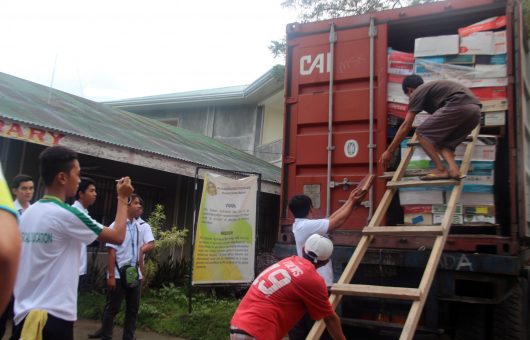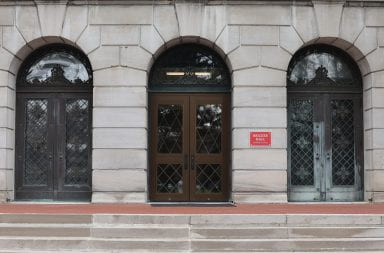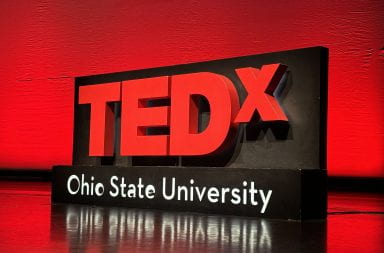
Over the last four decades, the Frances J. Ockerman Book Endowment has donated an estimated $866 million worth of books both nationally and internationally. Credit: Courtesy of Ohio State University Outreach and Engagement
High up on a wall in his office, Herbert Ockerman, a meat science professor at Ohio State, has a map of the world. Hundreds of different color-coded push pins cover the map, marking every continent except Antarctica.
Each pin represents a different conference he’s attended, the schools of graduate students he’s worked with and the locations where he has sent collections of donated books.
For the past four decades, Ockerman has sent a what he estimates to be $866 million in books to schools and universities in the United States and abroad through his program, the Frances J. Ockerman Book Endowment.
“If you get good help, and I’ve been fortunate to have gotten good help, then you can get through it. People will commit to you for a Saturday, if there isn’t a football game.” — Herbert Ockerman, founder Frances J. Ockerman Book Endowment and a meat science professor.
Ockerman said he was inspired to begin the book program after attending an agriculture conference in Brazil in 1974 and visiting an elementary school nearby.
“I asked the teacher at break, ‘Where were the books?’ And she said they didn’t have any books,” Ockerman said. “I said, ‘Where’s the teacher’s book?’ and she didn’t have one. I said, ‘You got a library?’ and she said, ‘We don’t have a library.’ Well how in the world can you teach without books?”
Ockerman visits three Half Price Books locations each day and scours the shelves for books one would find in major university libraries — on topics such as nursing, agriculture, math and law, as well as encyclopedias, how-to books and famous novels.
Chris Heuing, district manager for Half Price Books, said working with Ockerman on his book program has been “an honor.”
“It feels wonderful to be able to pay back to the world like this,” Heuing said. “We do a lot of things to donate locally, but to know that Dr. Ockerman is going out and going to all of these exotic places, it’s incredible. It’s incredible to know we get to play a small part in that.”
Ockerman’s program also accepts donated textbooks from Half Price Books, retired university professors, people downsizing their living spaces and from public libraries. Ockerman said the program helps upcycle books destined for second-hand stores or landfills.
“If the professor changes the book in a course — the book that costs $150 to $200 — we can hardly give them away,” Ockerman said. “They’re perfectly good books. Some of them haven’t even been opened … they’re just going to waste, so why not?”
But while the program accepts book donations, Ockerman said he refuses any monetary donations, paying for all of the program’s expenses out of pocket.
Ockerman said he spends four hours a night cleaning the books of Post-it notes and markings and taking a rough inventory of his finds, logging the prices in an ongoing document. The spreadsheet lists when, where and how many books were sent. Ockerman said he only started recording the value of his books 10 years after he began the project, because he didn’t think it would last.
Ockerman spends his Saturdays packing the books for shipment, filling boxes and loading them into a cargo carrier with the help of volunteers.
“If you get good help, and I’ve been fortunate to have gotten good help, then you can get through it,” Ockerman said. “People will commit to you for a Saturday, if there isn’t a football game.”
His first individual book shipment was sent to Taiwan in 1984. Since then, Ockerman has sent 36,000 books to more than 400 locations, including Australia, China, Turkey, Poland, Egypt and Canada. Ockerman also has three libraries named in honor of him — two in the Philippines and one in Atlanta.
Ockerman named the endowment program after his late wife, Frances, who he said was a major inspiration to his international endeavors.
“I was a provincial Kentucky boy before I met her and she told me I needed to see the world,” Ockerman said. “She was usually right, so I listened to her.”
Ockerman said the program will continue as long as people will accept his books, and that he enjoys being able to help fill a need through his donations.
“I can’t solve a lot of the world’s problems, but I can help with this,” he said.
The Engaged Scholars logo accompanies stories that feature and examine research and teaching partnerships formed between the Ohio State University and the community (local, state, national and global) for the mutually beneficial exchange of knowledge and resources. These stories spring from a partnership with OSU’s Office of Outreach and Engagement. The Lantern retains sole editorial control over the selection, writing and editing of these stories.



